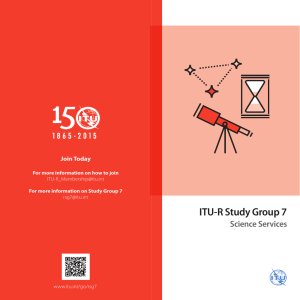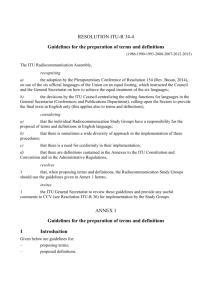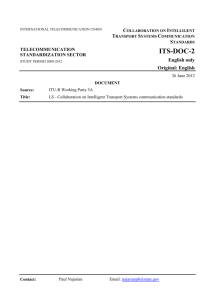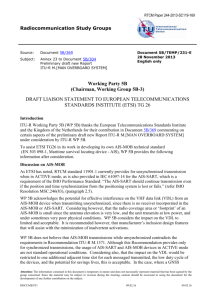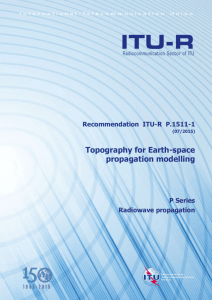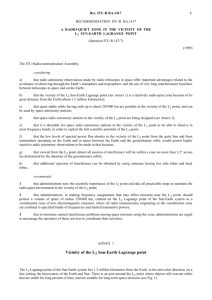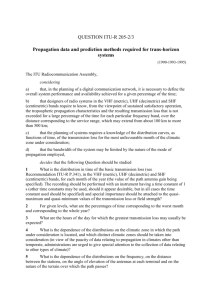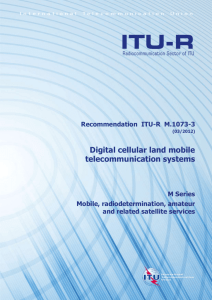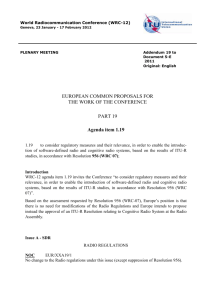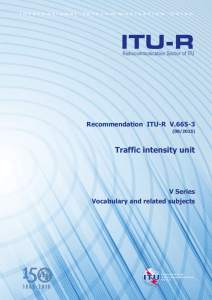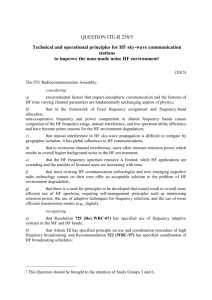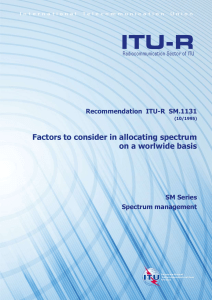Word 2007
advertisement
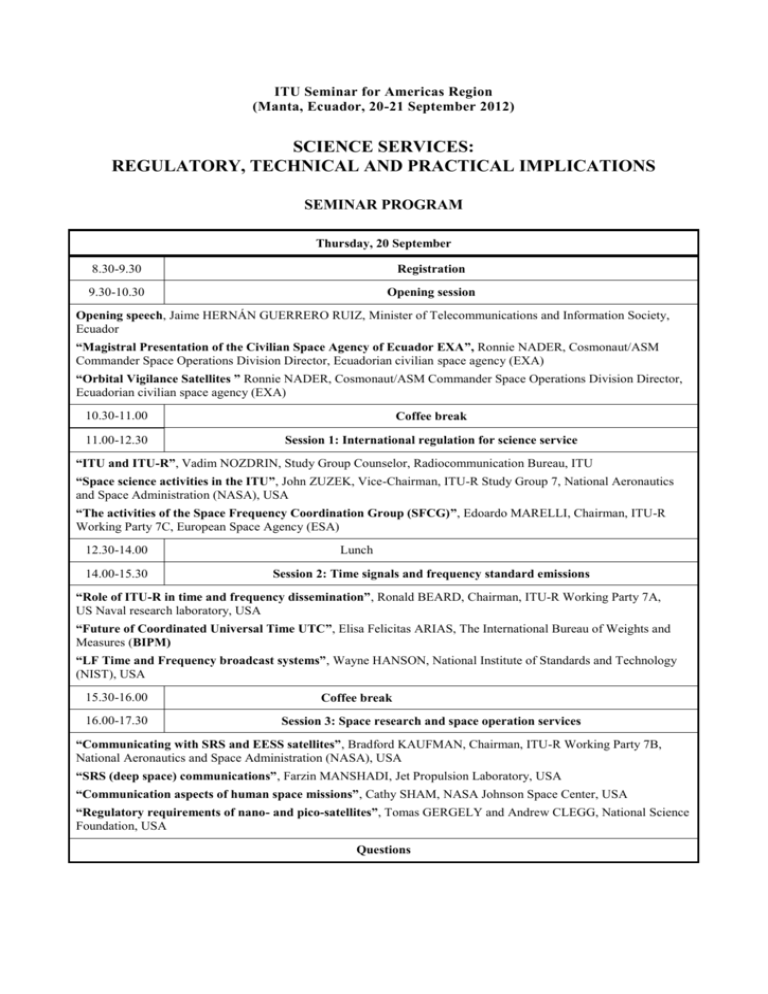
ITU Seminar for Americas Region (Manta, Ecuador, 20-21 September 2012) SCIENCE SERVICES: REGULATORY, TECHNICAL AND PRACTICAL IMPLICATIONS SEMINAR PROGRAM Thursday, 20 September 8.30-9.30 Registration 9.30-10.30 Opening session Opening speech, Jaime HERNÁN GUERRERO RUIZ, Minister of Telecommunications and Information Society, Ecuador “Magistral Presentation of the Civilian Space Agency of Ecuador EXA”, Ronnie NADER, Cosmonaut/ASM Commander Space Operations Division Director, Ecuadorian civilian space agency (EXA) “Orbital Vigilance Satellites ” Ronnie NADER, Cosmonaut/ASM Commander Space Operations Division Director, Ecuadorian civilian space agency (EXA) 10.30-11.00 Coffee break 11.00-12.30 Session 1: International regulation for science service “ITU and ITU-R”, Vadim NOZDRIN, Study Group Counselor, Radiocommunication Bureau, ITU “Space science activities in the ITU”, John ZUZEK, Vice-Chairman, ITU-R Study Group 7, National Aeronautics and Space Administration (NASA), USA “The activities of the Space Frequency Coordination Group (SFCG)”, Edoardo MARELLI, Chairman, ITU-R Working Party 7C, European Space Agency (ESA) 12.30-14.00 14.00-15.30 Lunch Session 2: Time signals and frequency standard emissions “Role of ITU-R in time and frequency dissemination”, Ronald BEARD, Chairman, ITU-R Working Party 7A, US Naval research laboratory, USA “Future of Coordinated Universal Time UTC”, Elisa Felicitas ARIAS, The International Bureau of Weights and Measures (BIPM) “LF Time and Frequency broadcast systems”, Wayne HANSON, National Institute of Standards and Technology (NIST), USA 15.30-16.00 16.00-17.30 Coffee break Session 3: Space research and space operation services “Communicating with SRS and EESS satellites”, Bradford KAUFMAN, Chairman, ITU-R Working Party 7B, National Aeronautics and Space Administration (NASA), USA “SRS (deep space) communications”, Farzin MANSHADI, Jet Propulsion Laboratory, USA “Communication aspects of human space missions”, Cathy SHAM, NASA Johnson Space Center, USA “Regulatory requirements of nano- and pico-satellites”, Tomas GERGELY and Andrew CLEGG, National Science Foundation, USA Questions -2- Friday, 21 September 09.00-10.30 Session 4: Satellite RF sensors (active and passive) “Radio frequency sensing from space”, Edoardo MARELLI, Chairman, ITU-R Working Party 7C, European Space Agency (ESA) “Passive RF sensing”, Jean PLA, Centre National d'Etudes Spatiales (CNES), France “Active RF sensing”, Bryan HUNEYCUTT, Jet Propulsion Laboratory, USA 10.30-11.00 Coffee break 11.00-12.30 Session 5: Meteorological-satellite radiocommunications “Overview of geostationary and non-geostationary MetSat systems”, Markus DREIS, European Organisation for the Exploitation of Meteorological Satellites (EUMETSAT) “How your weather forecast is made - its dependence on passive microwave data from satellites”, Richard KELLEY, Alion Science And Technology, USA “Distribution of MetSat data”, Jose ARIMATEA DE SOUSA BRITO, World Meteorological Organization (WMO) “An overview on the Data Collection Systems: case of low orbiting satellites”, Jean PLA, Centre National d'Etudes Spatiales (CNES), France “GOES Data Collection System”, Richard KELLEY, Alion Science And Technology, USA Lunch 14.00-15.30 Session 6: Meteorological aids service (radiosondes) and other systems “Radiosonde Operations”, Robert DENNY, National Oceanic and Atmospheric Administration (NOAA), USA “Radiosonde spectrum issues”, Davide FRANC, National Oceanic and Atmospheric Administration (NOAA), USA 15.30-16.00 Coffee break 16.00-17.30 Session 7: Radio astronomy and radar astronomy "Radio Astronomy: A special window to the universe", Tasso TZIOUMIS, Chairman, ITU-R Working Party 7D, Australia Telescope National Facility, Australia "Radio astronomy and radar astronomy: Latin-American’s prospectives", Tomas GERGELY, National Science Foundation, USA "Spectrum regulation and RAS: Keeping the window clean", Andy CLEGG, National Science Foundation, USA "Radioastronomy and the future ", Masatoshi OHISHI, Chairman, Scientific committee on frequency allocations for radio astronomy and space science (IUCAF), Japan 17.30-18.00 Closure
